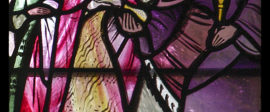Bad Boss? (1-Hour Small Group Study)
Small Group Study / Produced by TOW Project
For more small group studies on workplace issues, go to the SMALL GROUPS STUDIES INDEX.
INTRODUCTION TO THE ISSUE:
Because they are human and subject to the effects of the Fall, bosses can be arrogant, self-centered, or even abusive. Dealing with a bad boss requires extra tact and forethought. Here is a case study from the bible on one bad boss.
A BIBLE HERO WITH A BAD BOSS
Daniel had a bad boss. Not only was king Nebuchadnezzar self-possessed and violent, he had taken Daniel and his friends captive to work in his royal court. Nevertheless, Daniel deals with his supervisor in a shrewd way that gets results.
The king commanded his palace master Ashpenaz to bring some of the Israelites of the royal family and of the nobility, young men without physical defect and handsome, versed in every branch of wisdom, endowed with knowledge and insight, and competent to serve in the king’s palace; they were to be taught the literature and language of the Chaldeans. The king assigned them a daily portion of the royal rations of food and wine. They were to be educated for three years, so that at the end of that time they could be stationed in the king’s court. Among them were Daniel, Hananiah, Mishael, and Azariah, from the tribe of Judah. The palace master gave them other names: Daniel he called Belteshazzar, Hananiah he called Shadrach, Mishael he called Meshack, and Azariah he called Abednego.
But Daniel resolved that he would not defile himself with the royal rations of food and wine, so he asked the palace master to allow him not to defile himself. Now God allowed Daniel to receive favor and compassion from the palace master. The palace master said to Daniel, “I am afraid of the lord the king; he has appointed your food and your drink. If he should see you in poorer condition than the other young men of your age, you would endanger my head with the king.” Then Daniel asked the guard whom the palace master had appointed over Daniel, Hananiah, Mishale, and Azariah: “Please test your servants for ten days. Let us be given vegetables to eat and water to drink. You can then compare our appearance with the appearance of the young men who eat the royal rations, and deal with your servants according to what you observe.” So he agreed to this proposal and tested them for ten days. At the end of ten days it was observed that they appeared better and fatter than all the young men who had been eating the royal rations. So the guard continued to withdraw their royal rations and the wine they were to drink, and gave them vegetables.
(Daniel 1:3-16)
Daniel and his friends had several conflicts with their supervisor. First he changed their names to honor Babylonian Gods (Daniel 1:6-7) then he asked them to conform to local dietary customs (Daniel 1:8-16). In this hostile work environment, Daniel and his friends chose which battles to fight. They did not protest the renaming, perhaps because they knew the king couldn’t change their true allegiance to God. But they did make an issue out of the food, which was very important to their religious identity.
Daniel shows great tact in the way he raises this tricky issue with his superior. He talks to his boss respectfully, with a desire to maintain a good relationship. Daniel makes sure he understands the issue from the other person’s perspective. It turns out the palace master is worried about his own job, which includes keeping Daniel productive and healthy. Since health rather than food was the most important issue for the boss, Daniel suggests a test trial period that suits everyone’s needs.
Discuss:
- What lessons do you take from Daniel’s negotiation with his supervisor?
- How could these principles apply to a workplace conflict you face?
Even with the greatest tact and creativity, however, sometimes our work gives us people and problems we cannot fix. This may be true if your boss or your company asks you to do things at work that violate your moral code. For Daniel’s friends, the deal-breaker issue was idol worship. Not bowing down to an idol was so important that they were ready to sacrifice everything for it: their careers in the kings service and even their lives.
King Nebuchadnezzar made a golden statue whose height was sixty cubits and whose width was six cubits; he set it up on the plain of Dura in the province of Babylon. Then King Nebuchadnezzar sent for the satraps, the prefects, and the governors, the counselors, the treasurers, the justices, the magistrates, and all the officials of the provinces, to assemble and come to the dedication of the statue that King Nebuchadnezzar had set up. So the satraps, the prefects, and the governors, the counselors, the treasurers, the justices, the magistrates, and all the officials of the provinces, assembled for the dedication of the statue that King Nebuchadnezzar had set up. When they were standing before the statue that Nebuchadnezzar had set up, the herald proclaimed aloud, “You are commanded, O peoples, nations, and languages, that when you hear the sound of the horn, pipe, lyre, trigon, harp, drum, and entire musical ensemble, you are to fall down and worship the golden statue that King Nebuchadnezzar has set up. Whoever does not fall down and worship shall immediately be thrown into a furnace of blazing fire.” Therefore, as soon as all the peoples heard the sound of the horn, pipe, lyre, trigon, harp, drum, and entire musical ensemble, all the peoples, nations, and languages fell down and worshiped the golden statue that King Nebuchadnezzar had set up.
Accordingly, at this time certain Chaldeans came forward and denounced the Jews. They said to King Nebuchadnezzar, “O king, live forever! You, O king, have made a decree, that everyone who hears the sound of the horn, pipe, lyre, trigon, harp, drum, and entire musical ensemble, shall fall down and worship the golden statue, and whoever does not fall down and worship shall be thrown into a furnace of blazing fire. There are certain Jews whom you have appointed over the affairs of the province of Babylon: Shadrach, Meshach, and Abednego. These pay no heed to you, O king. They do not serve your gods and they do not worship the golden statue that you have set up.”
Then Nebuchadnezzar in furious rage commanded that Shadrach, Meshach, and Abednego be brought in; so they brought those men before the king. Nebuchadnezzar said to them, “Is it true, O Shadrach, Meshach, and Abednego, that you do not serve my gods and you do not worship the golden statue that I have set up? Now if you are ready when you hear the sound of the horn, pipe, lyre, trigon, harp, drum, and entire musical ensemble to fall down and worship the statue that I have made, well and good. But if you do not worship, you shall immediately be thrown into a furnace of blazing fire, and who is the god that will deliver you out of my hands?” Shadrach, Meshach, and Abednego answered the king, “O Nebuchadnezzar, we have no need to present a defense to you in this matter. If our God whom we serve is able to deliver us from the furnace of blazing fire and out of your hand, O king, let him deliver us. But if not, be it known to you, O king, that we will not serve your gods and we will not worship the golden statue that you have set up.”
Then Nebuchadnezzar was so filled with rage against Shadrach, Meshach, and Abednego that his face was distorted. He ordered the furnace heated up seven times more than was customary, and ordered some of the strongest guards in his army to bind Shadrach, Meshach, and Abednego and to throw them into the furnace of blazing fire. So the men were bound, still wearing their tunics, their trousers, their hats, and their other garments, and they were thrown into the furnace of blazing fire. Because the king’s command was urgent and the furnace was so overheated, the raging flames killed the men who lifted Shadrach, Meshach, and Abednego. But the three men, Shadrach, Meshach, and Abednego, fell down, bound, into the furnace of blazing fire.
Then King Nebuchadnezzar was astonished and rose up quickly. He said to his counselors, “Was it not three men that we threw bound into the fire?” They answered the king, “True, O king.” He replied, “But I see four men unbound, walking in the middle of the fire, and they are not hurt; and the fourth has the appearance of a god.” Nebuchadnezzar then approached the door of the furnace of blazing fire and said, “Shadrach, Meshach, and Abednego, servants of the Most High God, come out! Come here!” So Shadrach, Meshach, and Abednego came out from the fire. And the satraps, the prefects, the governors, and the king’s counselors gathered together and saw that the fire had not had any power over the bodies of those men; the hair of their heads was not singed, their tunics were not harmed, and not even the smell of fire came from them. Nebuchadnezzar said, “Blessed be the God of Shadrach, Meshach, and Abednego, who has sent his angel and delivered his servants who trusted in him. They disobeyed the king’s command and yielded up their bodies rather than serve and worship any god except their own God. Therefore I make a decree: Any people, nation, or language that utters blasphemy against the God of Shadrach, Meshach, and Abednego shall be torn limb from limb, and their houses laid in ruins; for there is no other god who is able to deliver in this way.” Then the king promoted Shadrach, Meshach, and Abednego in the province of Babylon.
(Daniel 3:1-30)
Discuss:
- What lessons do you take away from the story of Shadrach, Meshach, and Abednego?
- Have you ever been faced with a deal-breaker ethical issue at work? What would be a deal-breaker issue for you?











